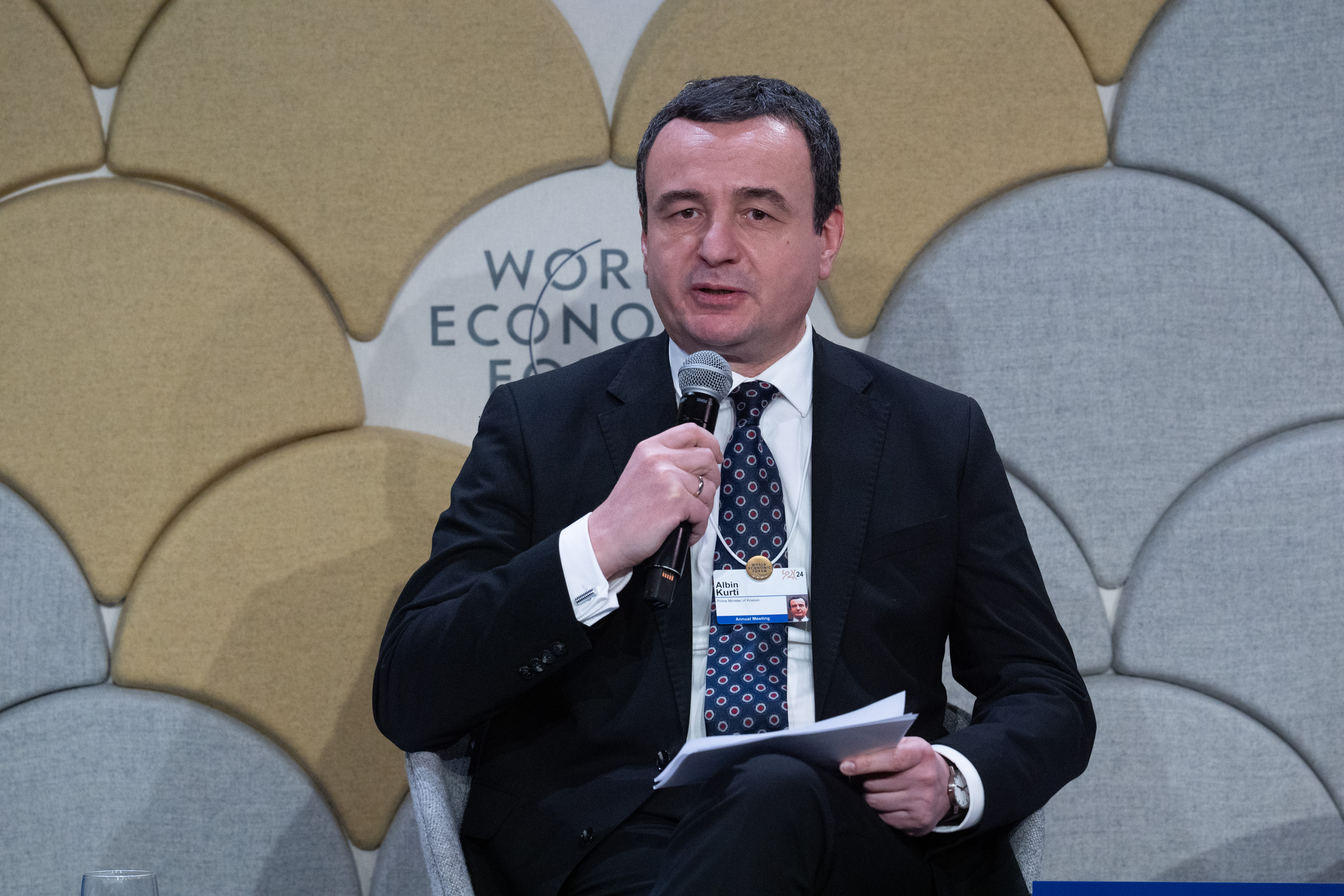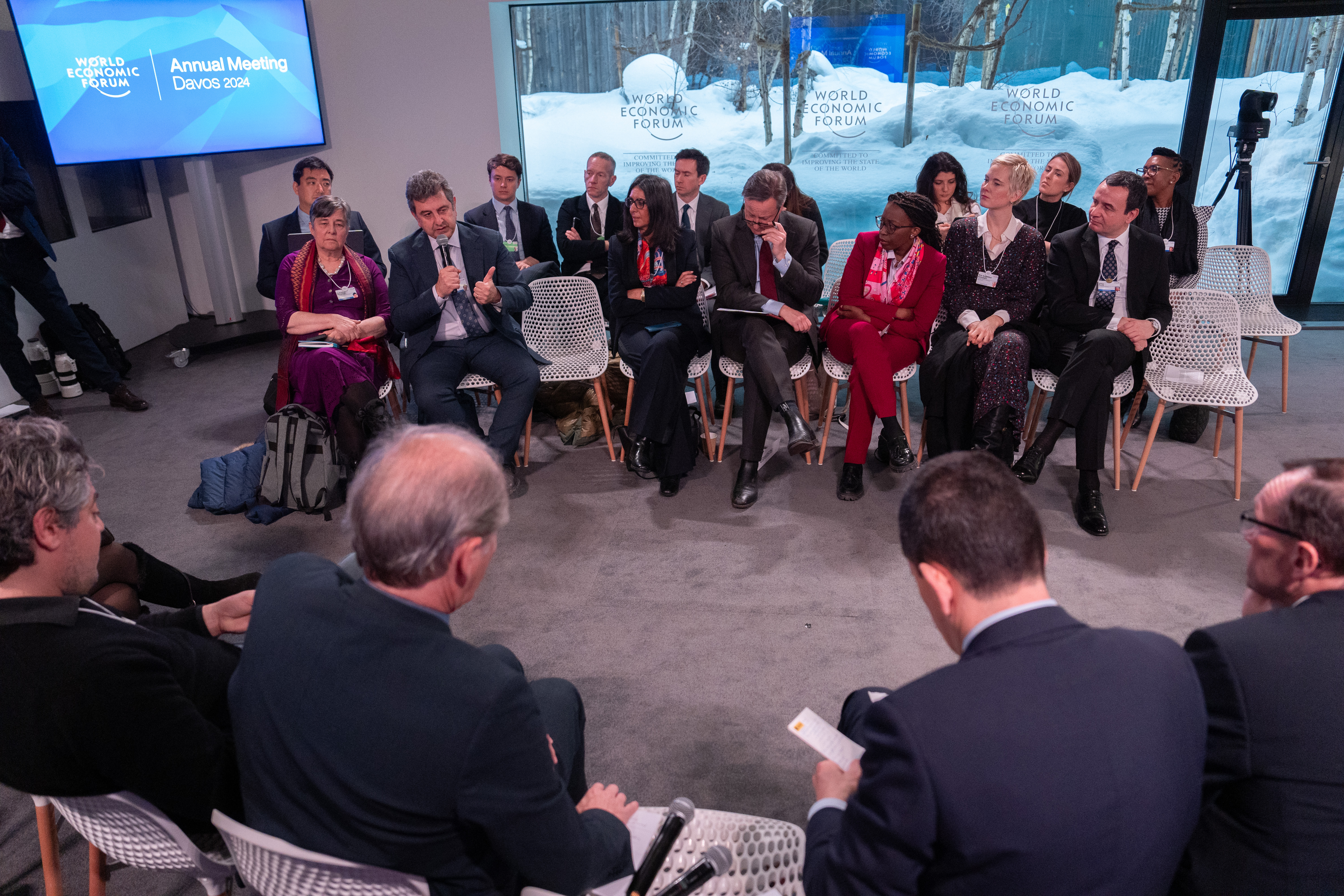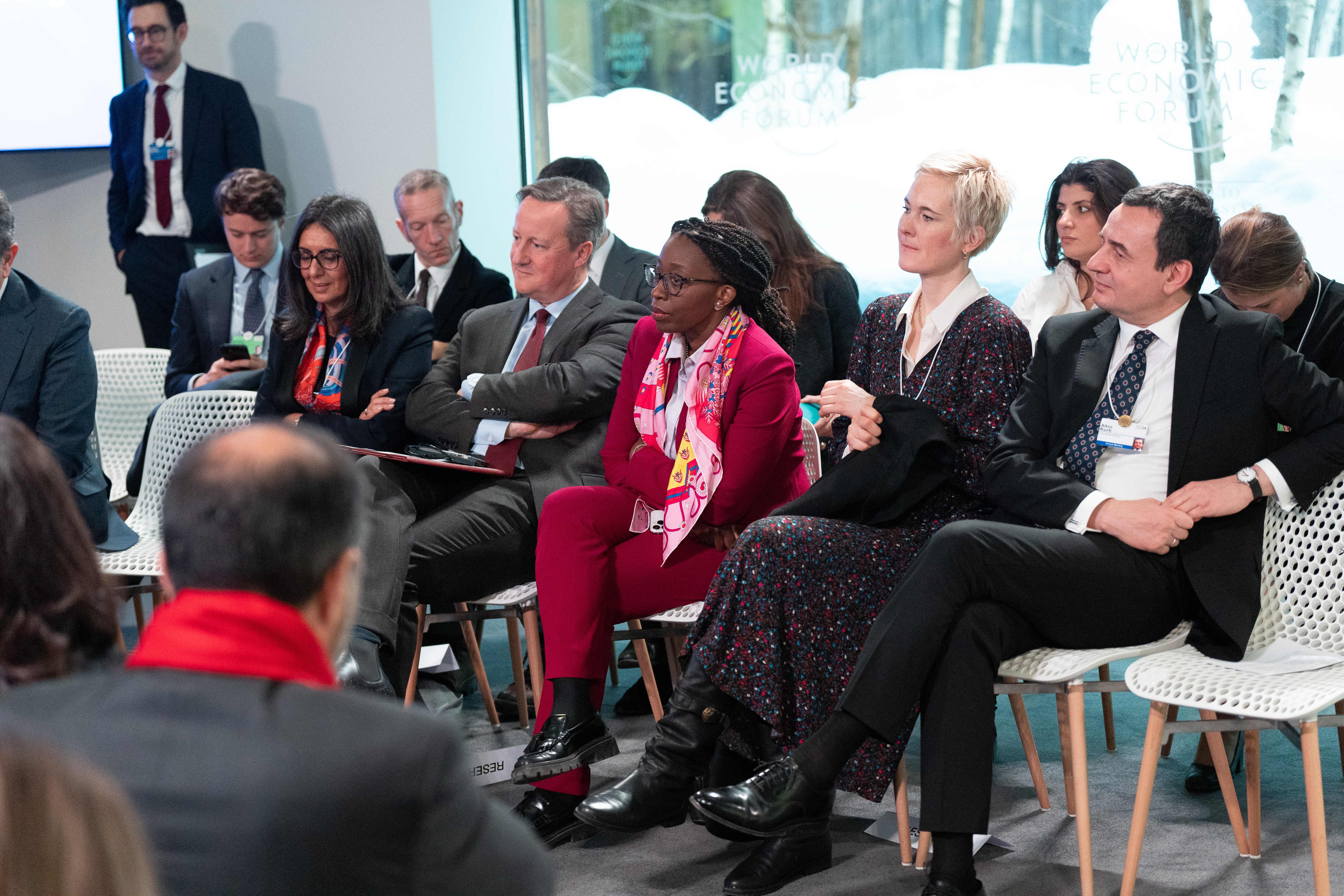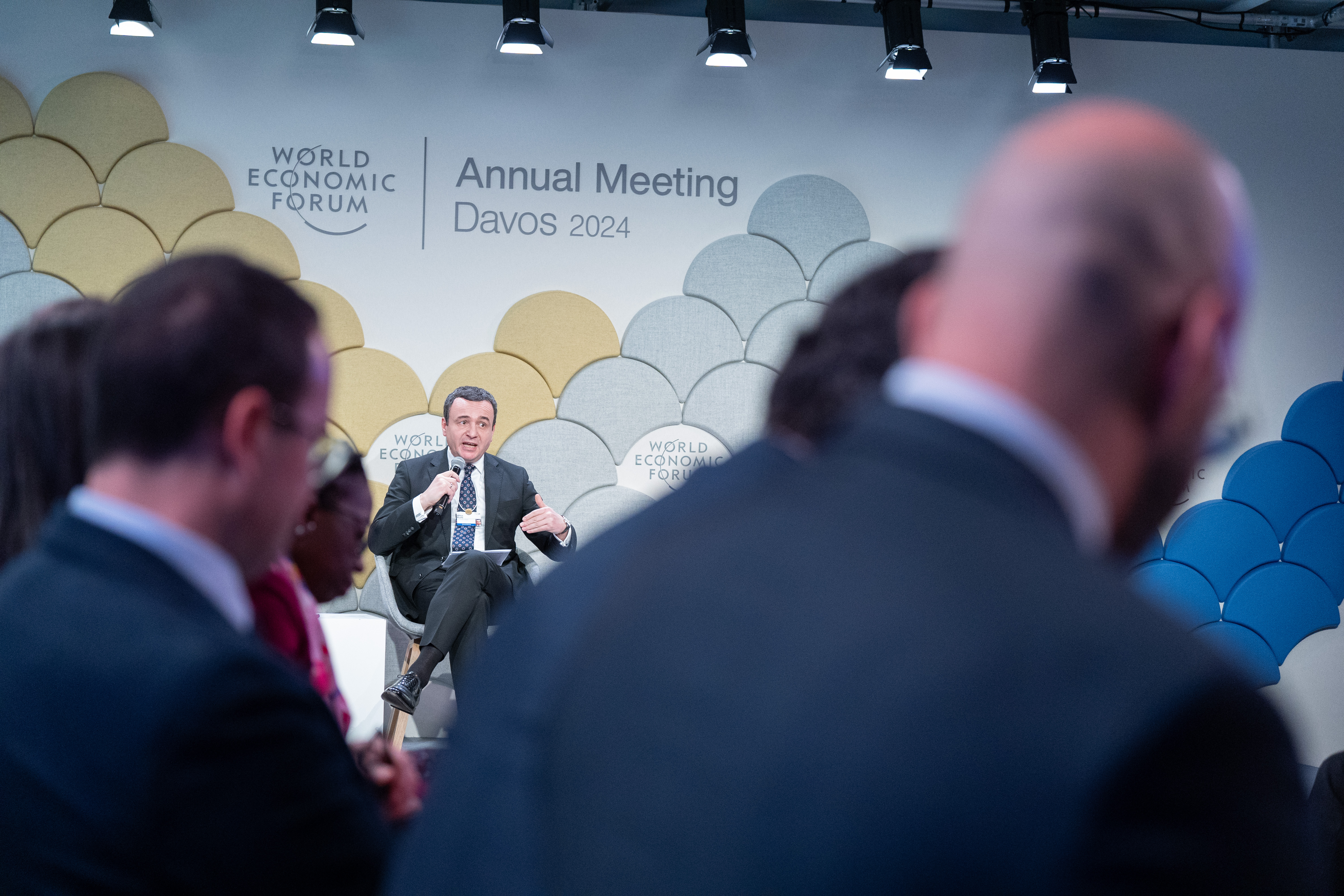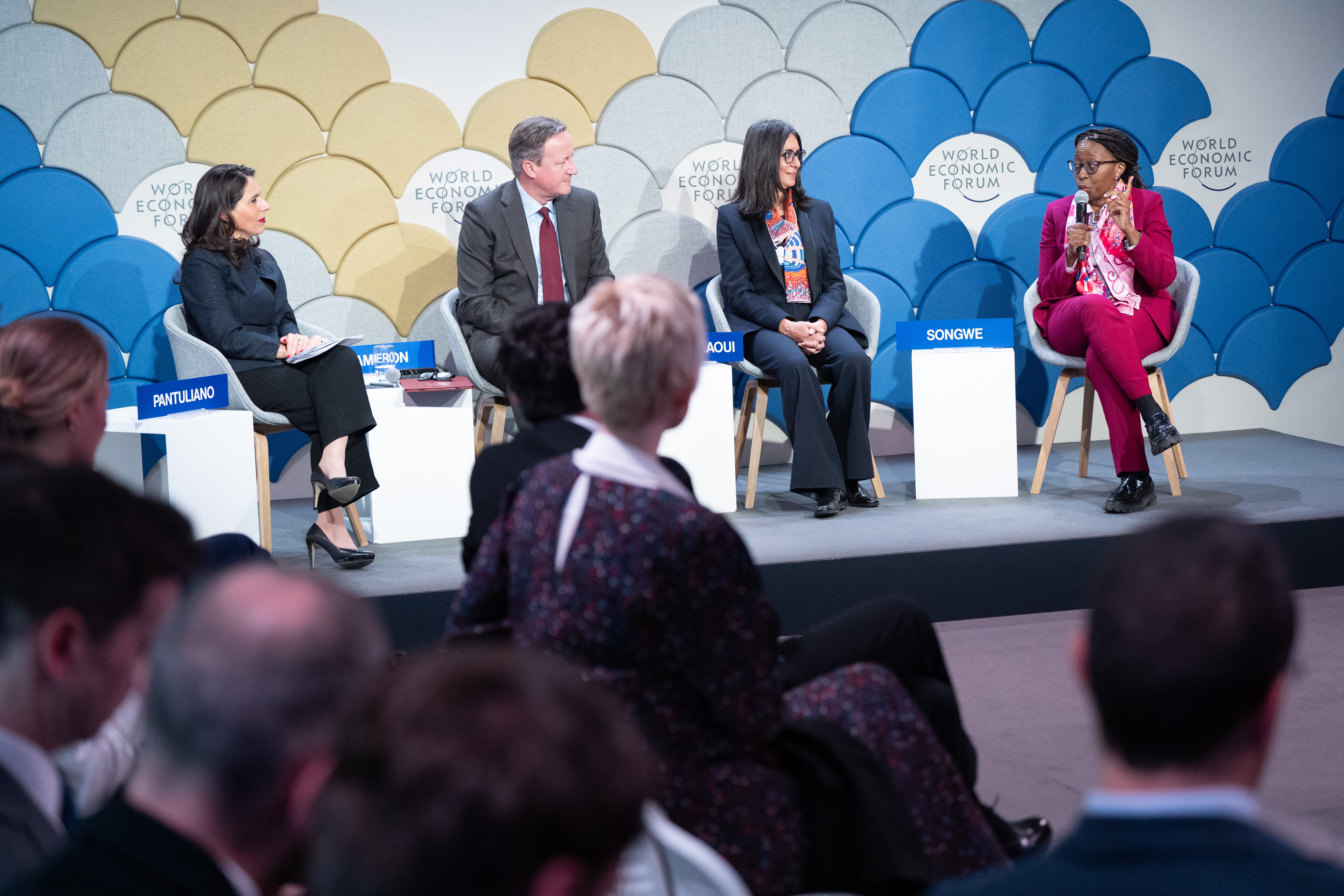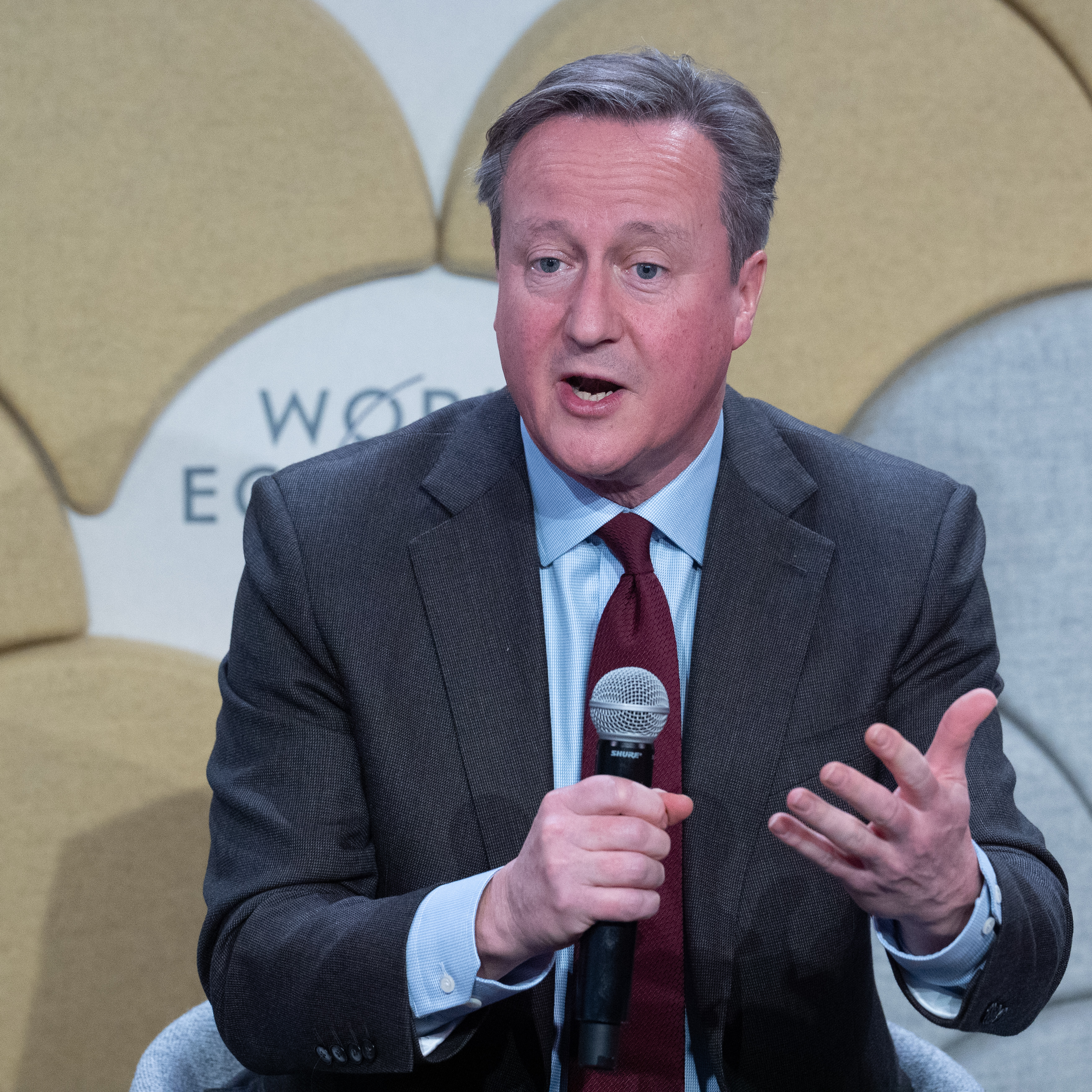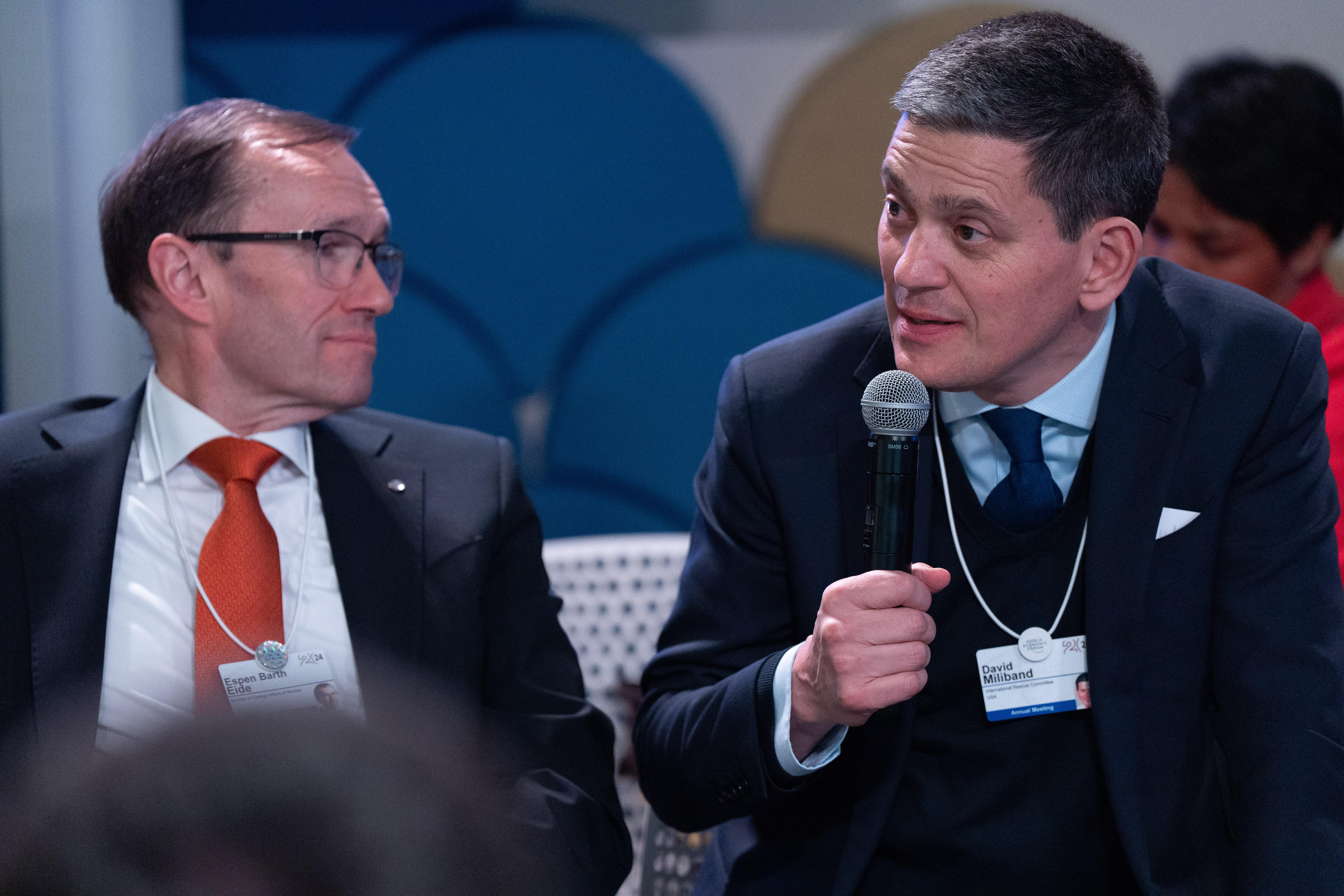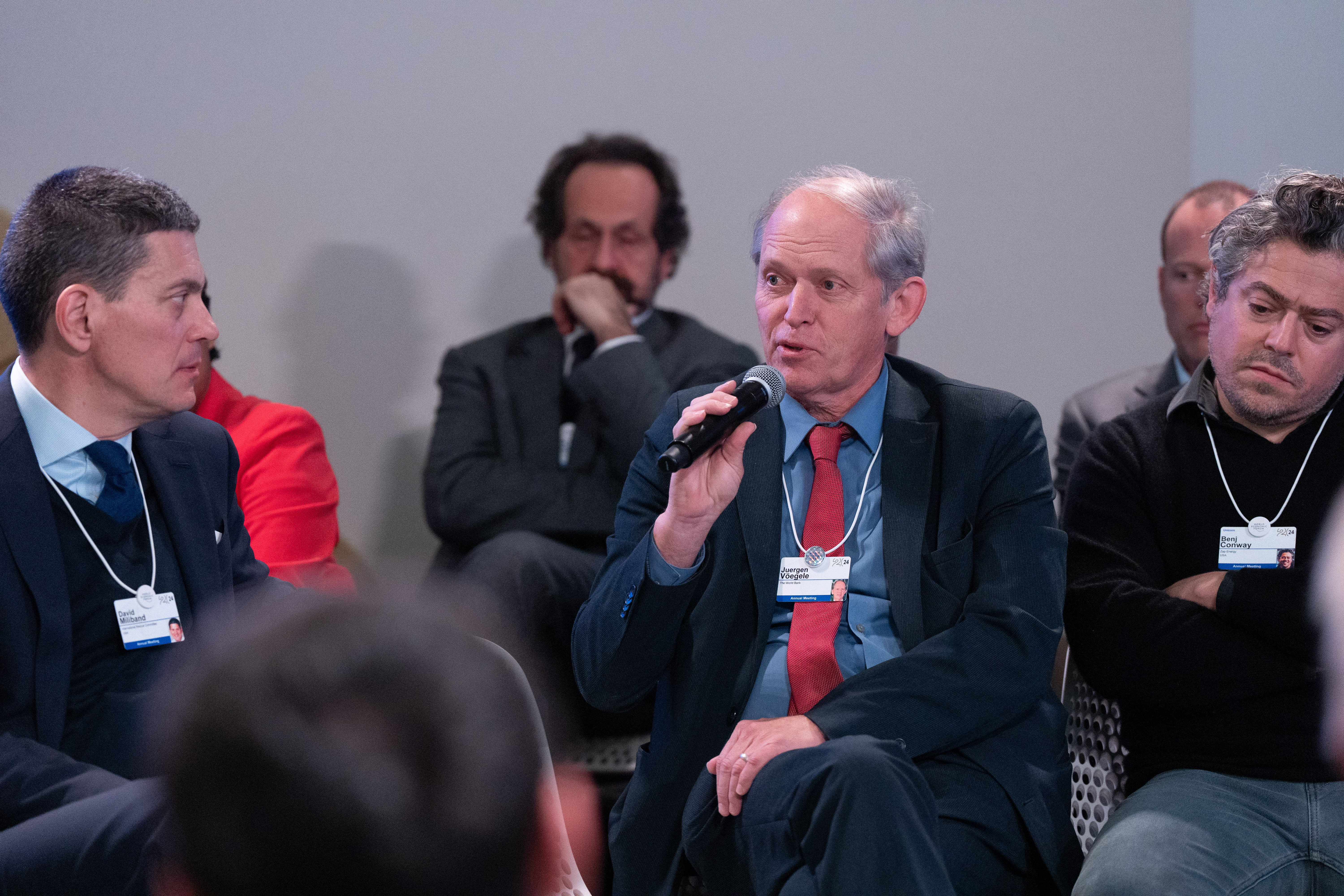- David Cameron, Secretary of State for Foreign, Commonwealth and Development Affairs of the United Kingdom, Nadia Fettah Alaoui, Minister of Economy and Finance of Morocco, Vera Songwe, Chair of the Board, Liquidity and Sustainability Facility, United Kingdom, Albin Kurti, Prime Minister of Kosovo, Espen Barth Eide, Minister of Foreign Affairs of Norway, David Miliband, President and Chief Executive Officer, International Rescue Committee, USA, Sara Pantuliano, Chief Executive, ODI, United Kingdom speaking in the Matching Finance to Need session at the World Economic Forum Annual Meeting 2024 in Davos-Klosters, Switzerland, 18 January. Accelerator. Copyright: World Economic Forum/ Greg Beadle
- David Cameron, Secretary of State for Foreign, Commonwealth and Development Affairs of the United Kingdom, Nadia Fettah Alaoui, Minister of Economy and Finance of Morocco, Vera Songwe, Chair of the Board, Liquidity and Sustainability Facility, United Kingdom, Albin Kurti, Prime Minister of Kosovo, Espen Barth Eide, Minister of Foreign Affairs of Norway, David Miliband, President and Chief Executive Officer, International Rescue Committee, USA, Sara Pantuliano, Chief Executive, ODI, United Kingdom speaking in the Matching Finance to Need session at the World Economic Forum Annual Meeting 2024 in Davos-Klosters, Switzerland, 18 January. Accelerator. Copyright: World Economic Forum/ Greg Beadle
- David Cameron, Secretary of State for Foreign, Commonwealth and Development Affairs of the United Kingdom, Nadia Fettah Alaoui, Minister of Economy and Finance of Morocco, Vera Songwe, Chair of the Board, Liquidity and Sustainability Facility, United Kingdom, Albin Kurti, Prime Minister of Kosovo, Espen Barth Eide, Minister of Foreign Affairs of Norway, David Miliband, President and Chief Executive Officer, International Rescue Committee, USA, Sara Pantuliano, Chief Executive, ODI, United Kingdom speaking in the Matching Finance to Need session at the World Economic Forum Annual Meeting 2024 in Davos-Klosters, Switzerland, 18 January. Accelerator. Copyright: World Economic Forum/ Greg Beadle
- David Cameron, Secretary of State for Foreign, Commonwealth and Development Affairs of the United Kingdom, Nadia Fettah Alaoui, Minister of Economy and Finance of Morocco, Vera Songwe, Chair of the Board, Liquidity and Sustainability Facility, United Kingdom, Albin Kurti, Prime Minister of Kosovo, Espen Barth Eide, Minister of Foreign Affairs of Norway, David Miliband, President and Chief Executive Officer, International Rescue Committee, USA, Sara Pantuliano, Chief Executive, ODI, United Kingdom speaking in the Matching Finance to Need session at the World Economic Forum Annual Meeting 2024 in Davos-Klosters, Switzerland, 18 January. Accelerator. Copyright: World Economic Forum/ Greg Beadle
- David Cameron, Secretary of State for Foreign, Commonwealth and Development Affairs of the United Kingdom, Nadia Fettah Alaoui, Minister of Economy and Finance of Morocco, Vera Songwe, Chair of the Board, Liquidity and Sustainability Facility, United Kingdom, Albin Kurti, Prime Minister of Kosovo, Espen Barth Eide, Minister of Foreign Affairs of Norway, David Miliband, President and Chief Executive Officer, International Rescue Committee, USA, Sara Pantuliano, Chief Executive, ODI, United Kingdom speaking in the Matching Finance to Need session at the World Economic Forum Annual Meeting 2024 in Davos-Klosters, Switzerland, 18 January. Accelerator. Copyright: World Economic Forum/ Greg Beadle
- David Cameron, Secretary of State for Foreign, Commonwealth and Development Affairs of the United Kingdom, Nadia Fettah Alaoui, Minister of Economy and Finance of Morocco, Vera Songwe, Chair of the Board, Liquidity and Sustainability Facility, United Kingdom, Albin Kurti, Prime Minister of Kosovo, Espen Barth Eide, Minister of Foreign Affairs of Norway, David Miliband, President and Chief Executive Officer, International Rescue Committee, USA, Sara Pantuliano, Chief Executive, ODI, United Kingdom speaking in the Matching Finance to Need session at the World Economic Forum Annual Meeting 2024 in Davos-Klosters, Switzerland, 18 January. Accelerator. Copyright: World Economic Forum/ Greg Beadle
- David Cameron, Secretary of State for Foreign, Commonwealth and Development Affairs of the United Kingdom, Nadia Fettah Alaoui, Minister of Economy and Finance of Morocco, Vera Songwe, Chair of the Board, Liquidity and Sustainability Facility, United Kingdom, Albin Kurti, Prime Minister of Kosovo, Espen Barth Eide, Minister of Foreign Affairs of Norway, David Miliband, President and Chief Executive Officer, International Rescue Committee, USA, Sara Pantuliano, Chief Executive, ODI, United Kingdom speaking in the Matching Finance to Need session at the World Economic Forum Annual Meeting 2024 in Davos-Klosters, Switzerland, 18 January. Accelerator. Copyright: World Economic Forum/ Greg Beadle
- David Cameron, Secretary of State for Foreign, Commonwealth and Development Affairs of the United Kingdom, Nadia Fettah Alaoui, Minister of Economy and Finance of Morocco, Vera Songwe, Chair of the Board, Liquidity and Sustainability Facility, United Kingdom, Albin Kurti, Prime Minister of Kosovo, Espen Barth Eide, Minister of Foreign Affairs of Norway, David Miliband, President and Chief Executive Officer, International Rescue Committee, USA, Sara Pantuliano, Chief Executive, ODI, United Kingdom speaking in the Matching Finance to Need session at the World Economic Forum Annual Meeting 2024 in Davos-Klosters, Switzerland, 18 January. Accelerator. Copyright: World Economic Forum/ Greg Beadle
Davos, 19 January, 2024
The Prime Minister of the Republic of Kosova, Albin Kurti, was a keynote speaker yesterday at the panel discussion “Matching finances with needs” at the World Economic Forum in Davos, where he participated alongside Secretary of Foreign Affairs of the United Kingdom, David Cameron, the Minister of Economy and Finance of Morocco, Nadia Fettah Alaoui, the Foreign Minister of Norway, Espen Barth Aide, the former Secretary for Foreign Affairs of United Kindom, David Milliband, the representative of the World Bank, Juergen Voegele and economist Vera Songwe.
In his introductory remarks, Prime Minister Kurti said that Kosova is a success story of a country that has built itself into a democracy with the help of international friends, a message that was reinforced by other high-level participants in the panel, such as Secretary David Cameron and Minister Barth Aide. All present enthusiastically congratulated the progress of Kosova.
The Prime Minister added that especially in recent years, our country has shown that economic and democratic progress go hand in hand, stressing that sustainability is essential for continued success and institutional stability.
“One country is progressing when the progress is felt from its citizens and this is combined with institutional stability. So, institutional stability stands higher than political stability and enables progress and endurance of such progress” said Prime Minister Kurti, emphasizing that Kosova’s democratic reforms have also been documented internationally.
He singled out the role of aid for the promotion of democracies while also making note of the importance of a democratic local government so that this aid reaches as many citizens as possible. He also stressed how the combination of the two will be a driving force in important transitions for the country, such as green investments and further growth.
At the end of his speech, the Prime Minister said that “Three categories of the population are building progress in our country: women, young people and workers. In all three of these categories, the diaspora is always present with remittances and more recently with its investments in our economy.”
Prime Minister Kurti’s opening speech:
Thank you, Sara. I’m honored to be among distinguished friends of Kosova — UK Foreign Secretary David Cameron, and former Foreign Secretary David Miliband — whose support for us stretches back for many years.
Kosova is a success story, a country that has built itself into a democracy with the help of international friends. Today, there is much skepticism about whether a country can change its course for the better, and if the help of others matters. In these times, it is good to be reminded of a country that makes the case for a world that cares.
As you Sara have pointed out, Kosova has come a long way since genocide and war, emerging as an upper-middle-income country with a strong democracy. Especially in the past few years, our country has demonstrated the fundamental truth that economic and democratic progress go hand-in-hand. This is not because we haven’t seen one happen without the other, but we haven’t seen one do so sustainably. I believe this is one of the most important lessons that Kosova can offer. Help is best allocated when you help yourself as well. The success of aid hinges on the interplay between the democracy of the country and collaboration with foreign actors.
Kosova’s democratic reforms have been internationally acknowledged. We’ve improved 20 places in Transparency International’s Corruption Perception Index and 22 places in Reporters Without Borders’ Media Freedom Index. At the same time our economy advanced. In the last three years, our budget increased by 35%, primarily benefiting the most disadvantaged citizens. Among other initiatives, we’ve introduced child-care subsidies, made public higher education free of charge and improved housing conditions for ethnic minority communities and those in need across the board. According to the World Bank, Kosova has provided the most generous aid package in the Western Balkans, as a percentage of GDP, to help citizens cope with the inflation. FDI and exports have doubled in the past three years, while our trade deficit has shrunk by a third. Since 2021, our budget surge is largely driven by a two-thirds increase in tax revenues, without changes in fiscal policy.
None of this would have been possible without the democratic progress I mentioned previously. One’s successful fight against corruption means that wealthy individuals and businesses can no longer evade taxes, the rest of the population believes their taxes will be returned with greater benefits and foreign companies know that a transparent government is the best deal a company can get.
One country is progressing when the progress is felt from its citizens and this is combined with institutional stability. So, institutional stability stands higher than political stability and enables progress and endurance of such progress.
Our country received vital international aid in the past 25 years, enabling me to share this story about Kosova today. And the effectiveness of this investment will be what elevates our country to consistently scoring among metrics along EU 27. To reach the next stage, we need the right intentions, transparent implementation, and help. Here is where democracy works. This is also where foreign investment fosters it, to the benefit of all.
The marriage between a country’s bona fide democratic drive and foreign investment is important for the goals we all share. Last week, 2023 was officially confirmed as the warmest year on record. This is one area in which external finance has a significant role to play going forward, in Kosova as in other countries.
Our country is relatively small in surface area — roughly 11,000 square kilometers, but it sits on one of the largest lignite reserves in the world: the fifth-largest globally and the third-largest in Europe. Nonetheless, our government is committed to a highly ambitious green agenda. We are in the midst of conducting our inaugural 100 MW Solar Auction, and we’ve attracted private-sector investments in the renewable-energy sector. We’ve also provided significant energy-efficiency subsidies to our citizens over the past two years, rewarding those who save, leading to lower energy demand and reduced emissions.
But we can and must do more, in close partnership with international financial partners. This is especially the case with green infrastructure projects. One important such project is a planned railway line linking Kosova’s capital city of Prishtina to the nearest port, located in Durrës, Albania. According to statistics, 30% of goods arriving to the port are destined for Kosova. Currently, all goods have to be transported exclusively via motorway. A railway will greatly reduce emissions and we need to rely at least partially on external financing to accomplish this.
September last year, in Crete, in Greece we won the bidding for Mediterranean Games 2030. For the first time a landlocked country is about to organize Mediterranean Games. 26 states will participate with their national teams and we are organizing Prishtina 2030 Mediterranean Games together with six other municipalities in Kosova and Durrës in Albania, precisely the port with which we want to build this railway.
However, something intended to eventually benefit the people must reach them before the finalization of large-scale projects. In Kosova daily life is shaped by a predominantly young and entrepreneurial population. It is crucial that individuals are given space to create, building immediate opportunities for them, particularly when these chances have not been previously afforded to them in the existing system. This sentiment, for instance, is shared by many women who rightfully feel that the world, and the workforce, have not been designed for them.
Three categories of the population are building the progress in our country: women, youth and workers. But, in all of these three categories, diaspora is also ever present with its remittances and recently its investments in our economy.
My last point is that, fine governance is about combining industry whose drive is expansion with finances whose drive is profit. We need both of them in a very fine governance of good intentions and transparent operations.
Once again, thank you to you Sara and I look forward to the panel discussion.
Complete discussion link:
https://protect-eu.mimecast.com/s/G0nkCG52BtzJVzcKUOjI?domain=f.io
Link to Prime Minister Kurti’s introductory speech:
Last modified: January 19, 2024
